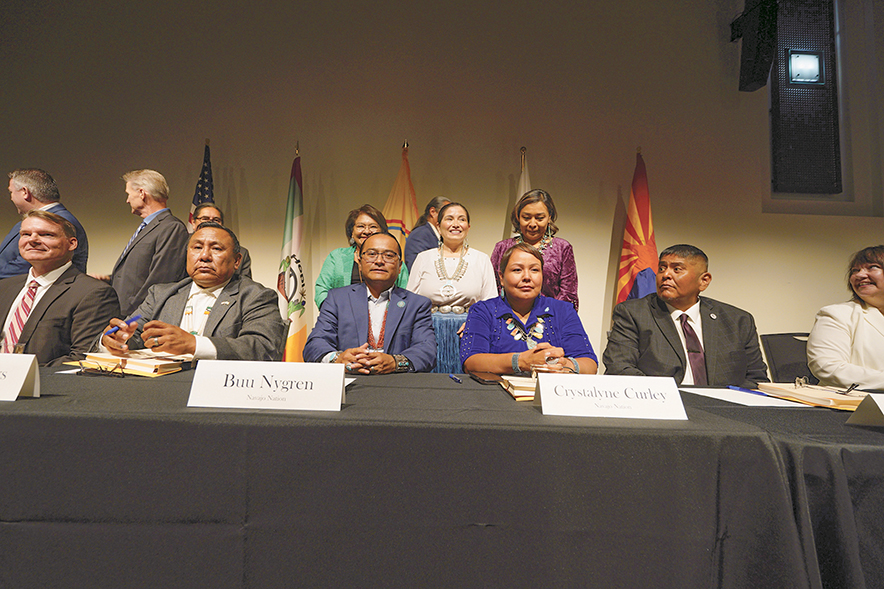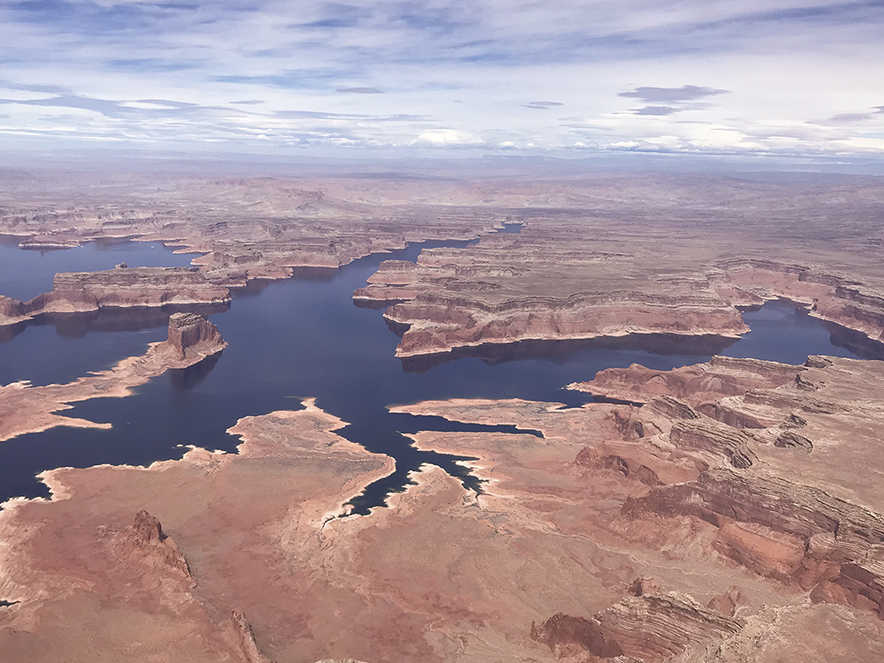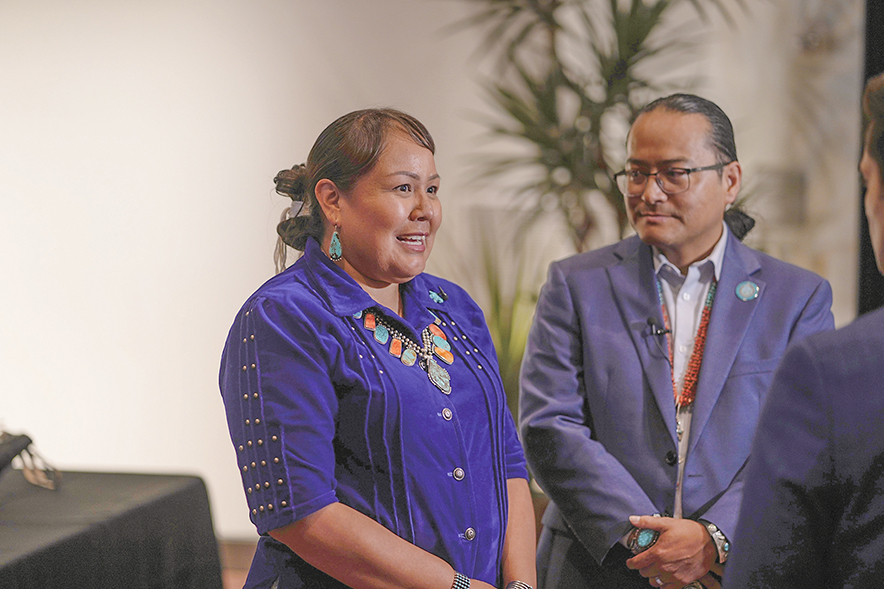
Tribes sign historic water rights settlement agreement

Special to the Times | Donovan Quintero
Hopi Vice Chairman Craig Andrews, President Buu Nygren, Speaker Crystalyne Curley, and San Juan Southern Paiute President Robbin Preston Jr. pose for a photo during a July 17 signing ceremony at the Heard Museum’s Steele Auditorium in Phoenix for a historic water settlement.
By Donovan Quintero
Special to the Times
PHOENIX — Navajo leadership, along with Hopi and San Juan Southern Paiute leaders, signed the Northeastern Arizona Indian Water Rights Settlement Agreement that, at least, signifies the seriousness of the three tribes’ intent to settle their water rights.

Navajo Times | Krista Allen
A bird’s-eye perspective of Lake Powell from Naatsis’áán, Utah, shows Colorado River water levels. Arizona tribes, the Navajo Nation, the Hopi Tribe, and the San Juan Southern Paiute, signed a landmark settlement on July 17 to bring water and land to communities.
The Navajo Nations Arizona water rights is coming a step closer to acquiring about 60 billion gallons of water annually, in its decades-long fight for it. The only obstacle left is convincing lawmakers in Washington, D.C., that this water rights agreement needs to be approved.
The approval and signing of the agreement would secure the tribe’s water rights and allow the Navajo Nation to move water around the Nation to where it’s needed.
Federal laws currently prevent the tribe from moving water to areas on the reservation with unreliable groundwater. But if the historic settlement is approved, it will enable the federal government to address those laws and allow the Navajo Nation to move water.
President Buu Nygren and Speaker Crystalyne Curley both heralded Wednesday morning’s signing, which took place at the Heard Museum’s Steele Auditorium in Phoenix.
“So many of my colleagues, who are leaders or advocates or champions, we thought that we would never come to this day, and we’re here today,” Nygren said. “We’re at a wonderful place today to celebrate something that’s been in the works for decades.”
The Navajo Nation’s settlement affirms and quantifies substantial and enforceable rights to water in Arizona for the Navajo tribe and Navajo people: the settlement guarantees 44,700 AFY (acre-feet per year) of the Arizona allocation of Upper Basin Colorado River Water; this is 90% of Arizona’s Upper Basin allocation, 3,600 AFY of Fourth Priority Lower Basin Colorado River Water; all the Little Colorado River water that reaches the Navajo Reservation. Historic flows are estimated to be 122,000 AFY; all the Navajo Aquifer that underlies the reservation with a limit on pumping up to 8,400 AFY; and all the Coconino Aquifer that underlies the Navajo Nation.
The three primary aquifers, according to the Coconino County website, that provide groundwater are the Navajo Aquifer, the Coconino Aquifer, and the R-M Aquifer. Of the three, the R-M aquifer is the deepest and the only one that underlies the entire county. The N-Aquifer has historically been a source of domestic, municipal, industrial, and livestock water use for both the Navajo Nation and the Hopi Tribe, and the community of Fredonia. The C-Aquifer is the main source of municipal water for the larger communities and developments in southern Coconino County. The R-M aquifer provides domestic and municipal waters to small communities such as Williams, Valle, Supai, and Tusayan.
In addition, the settlement will secure $5 billion in funding to build substantial and much-needed water delivery infrastructure and eight waterline projects that will deliver water to 45 Navajo communities, from LeChee to Dilkon, to Nahat’á Dziil, according to Legislation 0109-24 that approves a limited waiver of sovereign immunity.
The funding will kickstart the eight water projects: the Iiná bá – Paa Tuwaqat’si Pipeline, the Southwest Navajo Regional Project, the Ganado Area Project, the Code Talker Lateral, the Black Mesa Project, the Four-Corners Project, the Kayenta Area Project, and the Lupton Area Project, and will build substantial and much-needed water delivery infrastructure.
Curley took the time to thank members of the 25th Navajo Nation Council who “stuck together” since last April and being “driven-focused.”
“And at the end of the day, it was a unanimous support with no discussion but just full support and just a sigh of relief, saying that this is our time,” Curley said. “This is our time to have access to what has been ours long ago, since the time of our emergence as Navajo people.”

Special to the Times | Donovan Quintero
Speaker Crystalyne Curley speaks with attendees during Wednesday’s water settlement signing at the Heard Museum in Phoenix.
Delegate Casey Allen Johnson said he remembers when he bathed in a tub as his father doused him with water as he watched the signing of the water rights agreement.
“We grew up being in the Bennett Freeze, being in that area, hauling water, in Cameron where we weren’t able to have no running water because it was within the Bennett Freeze, and we had to haul water,” Johnson said. “I remember times where I had to take a bath and, in a tub, outside, where my father had to, you know, fill up a little bit of that water in the tub so I could take a bath.”
Johnson added he is not the only Navajo who’s grown up with no running water and said they also had to haul water.
“It was just something we endured,” he said. Johnson represents Cameron, Coalmine Canyon, Birdsprings, Leupp, and Tolani Lake.
Efforts to define and protect the water rights of the Navajo Nation have been ongoing. The settlement finalized with Nygren’s signature, opens opportunities for economic development and sustainability for the tribe, which are essential for preserving the cultural and environmental heritage of the Navajo people.
Nygren said it was time to lobby Congress next week and convince them to complete the historic circle so that all Arizonans and tribal citizens could prosper from it.
“This is what we do for our Arizona citizens, our communities, and let us be able to plan for the future,” he said.








 Highway 264,
Highway 264, I-40, WB @ Winslow
I-40, WB @ Winslow